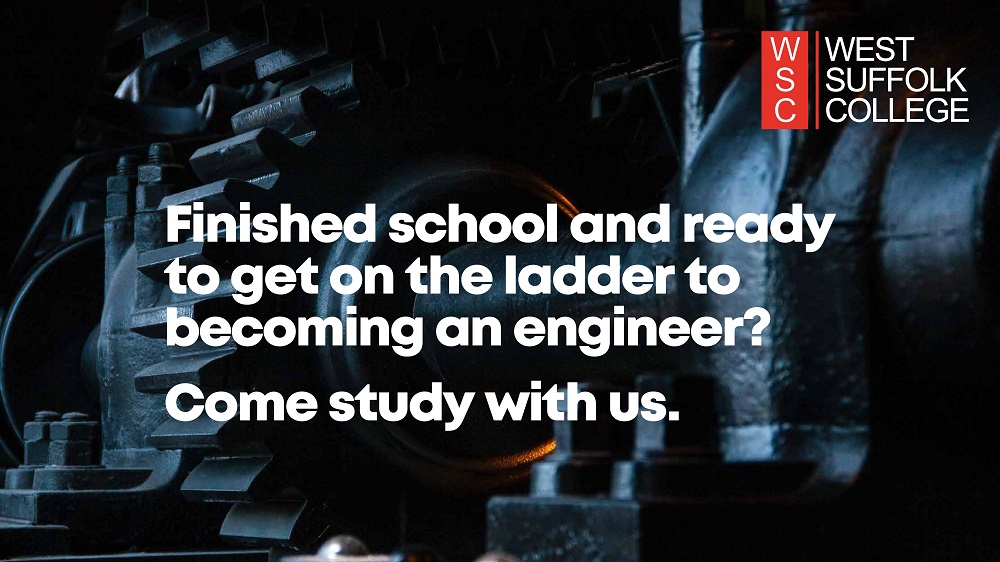
Our Prospectus

Courses

The UK is once again one of the global leads for Engineering and Manufacture. Our innovation and high quality, together with efficient timescales of delivery make us stand out. The East of England is a powerhouse for the UK economy much of which comes from the outstanding engineering companies in the region.
At West Suffolk College we offer organisations and learners the chance to learn and develop the skills required to ensure engineering remains prominent in the local area. We offer Level 2 to Level 6 and work with employers across many different pathways such as Mechanical, Electrical, Electronic, Maintenance, Welding, Tool Making, Design, Installation etc. Our excellent facilities allow for learning to be conducted in a very supportive environment and our work based team helps to embed that classroom knowledge fully in the workplace.

Engineering at West Suffolk College provides a practical and theoretical introduction to mechanical and electronic engineering, computer aided drawing and microprocessing. You’ll get the skills to help solve the problems of tomorrow – from how aircraft work to the electronics in your mobile phone.
The Level 3 course could earn you enough UCAS points to study engineering at any UK university or take an advanced apprenticeship, working with an engineering firm and career off to an early start.


This Access to Higher Education course is a one-year, full-time Level 3 course specifically designed to enable you to develop the knowledge and study skills to progress into Higher Education.
This pathway is suitable for those wanting to study Engineering,
The diploma allows learners to undertake study related to engineering, maths and science topics. Learners will have the opportunity to develop skills which will enable progression to a range of degree level programmes.
The mandatory units include a mixture of Study Skills, Preparation for HE, Engineering, and Physics.
This occupation is found both on construction sites and in existing buildings. Building services engineering ensures that buildings function properly. It is a specialised branch of engineering in the construction industry.
A craftsperson undertakes the planning, installation, testing, pre-commissioning, commissioning, and decommissioning of systems heating, chilled water, hot water, and cold-water systems. These systems are used within a variety of locations, including workplaces, businesses, schools, and hospitals.
| Qualification type | Level 3 Diploma |
| Duration | 2 years |
| Study times | You will be expected to be in college for a minimum of 3 days per week, from 9:00 to 4:00. Your timetable will be confirmed at induction. |
| Entry requirements | 4 GCSEs at 4 or above in English and relevant subjects, and including Maths at grade 5. |
| Campus | West Suffolk College Sixth Form campus, Bury St Edmunds |
| Work placements | Industrial placements |
This occupation is found in manufacturing and process sectors.
The broad purpose of the occupation is to produce complex high value, low volume components or assemblies in full or part, using machines, equipment or systems, to the required specification. For example, turbines, cranes, gearboxes, production lines, rigs and platforms. Fitters may typically have a mechanical, electrical, electronic, control systems, pipe fitting or instrumentation bias or operate across multiple disciplines depending on the type of assembly. To produce or re-furbish the components fitters will interpret drawings/specifications and plan their work, for example ensuring they have the right tools, equipment and resources to complete the task to the required specification. Fitters are required to check their work against quality standards and make adjustments as required based on their knowledge. On completion of the task a fitter will hand over the product and prepare the work area for the next task by checking equipment meets the standards required to operate. They may be based in a workshop or clients premises - this may include hazardous environments.
In their daily work, an employee in this occupation typically interacts with line managers/supervisors; depending on the size of the employer and nature of the work they may work as part of a team of fitters or independently. They may interact with personnel in other functions for example installation and maintenance engineers, health & safety and quality assurance personnel, as well as internal or external customers.
An employee in this occupation will be responsible for completion of their work to the required specification and deadlines, in line with quality, health & safety and environmental regulations and requirements, with minimum supervision.
This occupation is found in manufacturing and process sectors.
The broad purpose of the occupation is to produce complex high value, low volume components or assemblies in full or part, using machines, equipment or systems, to the required specification. For example, turbines, cranes, gearboxes, production lines, rigs and platforms. Fitters may typically have a mechanical, electrical, electronic, control systems, pipe fitting or instrumentation bias or operate across multiple disciplines depending on the type of assembly. To produce or re-furbish the components fitters will interpret drawings/specifications and plan their work, for example ensuring they have the right tools, equipment and resources to complete the task to the required specification. Fitters are required to check their work against quality standards and make adjustments as required based on their knowledge. On completion of the task a fitter will hand over the product and prepare the work area for the next task by checking equipment meets the standards required to operate. They may be based in a workshop or clients premises - this may include hazardous environments.
In their daily work, an employee in this occupation typically interacts with line managers/supervisors; depending on the size of the employer and nature of the work they may work as part of a team of fitters or independently. They may interact with personnel in other functions for example installation and maintenance engineers, health & safety and quality assurance personnel, as well as internal or external customers.
An employee in this occupation will be responsible for completion of their work to the required specification and deadlines, in line with quality, health & safety and environmental regulations and requirements, with minimum supervision.
Page 1 of 3
Follow Us
Stay up-to-date on the latest news & events